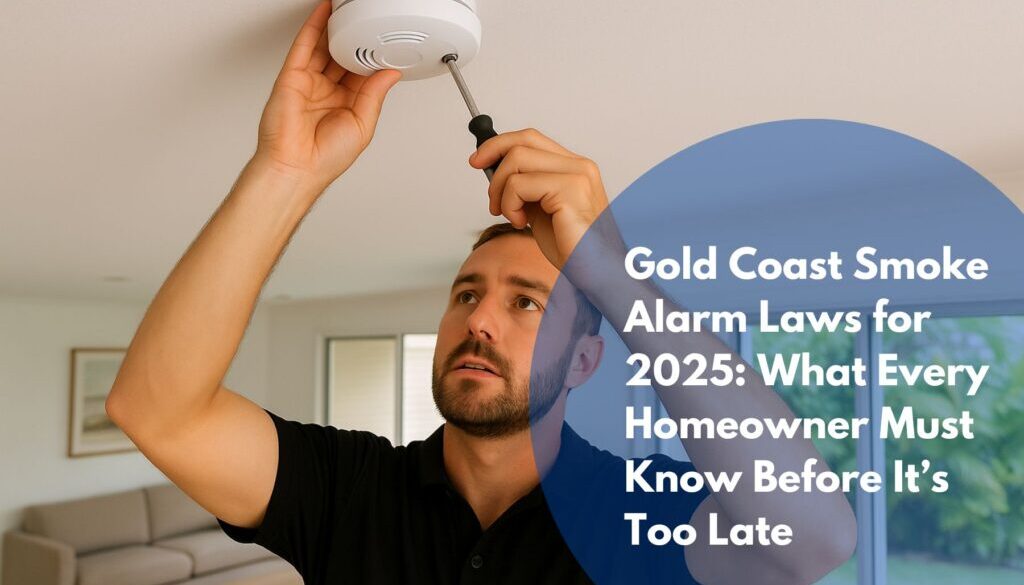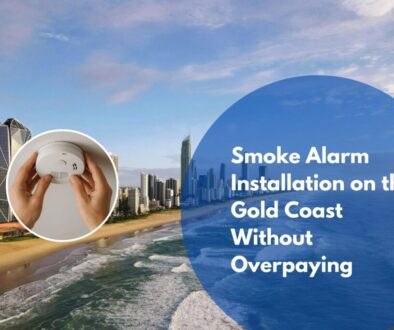Gold Coast Smoke Alarm Laws for 2025: What Every Homeowner Must Know Before It’s Too Late
By 1 January 2027, every home in Queensland must meet strict smoke alarm compliance laws—but many Gold Coast property owners still don’t understand what that actually means. Now is the time to act, before fines, voided insurance, or fire risks catch up with you.
Big Changes Are Coming for Gold Coast Property Owners
Queensland’s smoke alarm laws are changing—and time is running out to get compliant. If you’re a homeowner, landlord, or investor on the Gold Coast, the countdown to 1 January 2027 should be firmly on your radar. By that date, every residential property in the state must meet the full requirements for smoke alarm compliance under the amended Fire and Emergency Services Act. The penalties for ignoring these laws range from fines to insurance complications—and even legal liability in the event of a fire.
These regulations aren’t just about ticking a compliance box. They’re about protecting lives, improving early fire detection, and reducing avoidable tragedies in residential homes. But despite years of phased legislation, many properties remain non-compliant simply because owners don’t understand the finer details of what’s required.
What exactly does “compliance” mean? It’s more than just installing a few alarms from your local hardware store. The law requires photoelectric alarms, installed in specific locations, interconnected throughout the home, and powered by hardwiring or non-removable 10-year batteries. This applies to all existing private homes, units, and townhouses, whether they’re being lived in, rented out, or prepared for sale.
The good news? You still have time to meet the 2027 deadline—but waiting is a gamble. Demand for certified installers will only grow, and rushing at the last minute could cost more or delay your compliance.
In this article, we’ll break down exactly what’s changing, what compliance really looks like, and how you can get ahead of the deadline with help from trusted local professionals like MWT Electrical Services.
What’s Changing by 1 January 2027: The Full Compliance Deadline
Queensland’s smoke alarm laws have been rolling out in stages for several years, but the final major deadline is fast approaching. From 1 January 2027, every owner-occupied home, townhouse, and unit must comply with strict new smoke alarm standards. If you’re living in your property, not just renting it out or selling it, these rules now apply to you directly.
Timeline of Queensland’s Smoke Alarm Legislation
-
2017: Laws introduced for all new homes, major renovations, and changes in rental or sale agreements.
-
2022: Rental properties and properties being sold must meet full compliance (photoelectric, interconnected alarms).
-
2027: All existing private homes, townhouses, and units (including owner-occupiers) must comply—regardless of sale or lease status.
These staged rollouts were designed to give homeowners plenty of time to act. But with the 2027 deadline fast approaching, waiting much longer could leave you scrambling alongside thousands of other property owners.
New Requirements for Homes on the Gold Coast
From 2027 onwards, all private residences must have:
-
Photoelectric smoke alarms only — no ionisation models.
-
Interconnected alarms — when one goes off, they all go off.
-
Hardwired alarms (240v mains power) with a backup 10-year non-removable battery, or alarms powered solely by a non-removable 10-year lithium battery.
And in terms of placement:
-
An alarm must be installed in every bedroom.
-
An alarm must be installed in hallways that connect bedrooms to the rest of the dwelling.
-
If no hallway exists, an alarm must be installed between bedrooms and the rest of the storey.
-
If there are no bedrooms on a storey, install at least one alarm in the most likely path to the exit.
Pro Tip:
If your current alarms don’t meet all four conditions—photoelectric, interconnected, properly placed, and powered by law—you are not compliant under the 2027 standard.
Smoke Alarm Compliance Checklist: What Every Home Needs
Understanding the smoke alarm requirements is one thing—meeting them in full is another. Queensland’s legislation is specific and non-negotiable, and many Gold Coast homes still fall short without realising it. To ensure your property is fully compliant by the 1 January 2027 deadline, every box on this checklist must be ticked.
1. Photoelectric Technology Only
-
All alarms must be photoelectric—not ionisation-based.
-
Look for the AS 3786–2014 standard clearly printed on the alarm body.
-
Avoid any model with an ionisation sensor symbol (often indicated with a warning icon or radiation symbol).
2. Alarms Must Be Interconnected
-
All alarms in the home must be interconnected—so when one activates, they all sound.
-
Interconnection can be achieved via hardwiring or wireless connectivity.
-
This ensures that all occupants are alerted simultaneously, regardless of where the fire starts.
3. Correct Power Supply
-
If existing alarms are hardwired, they must be replaced with hardwired models.
-
New alarms must be powered either:
-
By 240v mains power with a backup non-removable 10-year battery, or
-
Solely by a non-removable 10-year lithium battery.
-
-
Alarms with changeable 9V batteries do not comply with current legislation.
4. Correct Placement Throughout the Home
-
One smoke alarm must be installed in each bedroom.
-
One in every hallway that connects bedrooms with other areas of the home.
-
If there is no hallway, place the alarm between the bedroom and the rest of the storey.
-
On levels without bedrooms, at least one smoke alarm must be installed in the most likely path of exit.
Important Note:
Most homes that fail to comply are either missing alarms in bedrooms or lack interconnection between units. Even relatively new alarms may not meet the legal standard if they’re not properly installed or powered.
Selling, Leasing, or Renovating? Compliance Is Not Optional
Whether you’re putting your Gold Coast property on the market, preparing it for a new tenant, or undertaking major renovations, smoke alarm compliance isn’t just best practice—it’s a legal requirement. Failing to meet the current standards can delay sales, void lease agreements, and even expose property owners to fines or legal action.
Selling a Property? You Must Comply Before Settlement
If you’re planning to sell a home or unit in Queensland, you’re legally required to ensure it is fully compliant with current smoke alarm legislation before settlement. Here’s what that means:
-
All smoke alarms must meet the photoelectric, interconnected, AS 3786–2014 standard.
-
Alarms must be installed in all bedrooms, hallways, and storeys.
-
The seller must complete and sign a Form 24 declaration, confirming that the property is compliant.
Without this declaration, the property transfer can’t be finalised, and buyers may walk away or request compliance work be done at your expense before settlement.
Landlords and Property Managers: Ongoing Legal Responsibilities
If you lease out property:
-
You are required to ensure compliance before any new tenancy or lease renewal.
-
Within 30 days of a lease starting, each alarm must be tested and cleaned, and any flat or near-flat batteries must be replaced.
-
If an alarm is found to be non-compliant during an inspection or incident, you may face fines, QCAT action, or tenant compensation claims.
While property managers may handle smoke alarm servicing on your behalf, the legal responsibility lies with the landlord.
Renovations and Building Work: Stay in Step with the NCC
If you’re undertaking major renovations or building a new home, your smoke alarm system must be installed:
-
In accordance with the National Construction Code (NCC), and
-
In full compliance with Queensland’s Fire and Emergency Services Act.
Engaging a qualified electrician like MWT Electrical Services ensures your upgrades are compliant from the ground up, avoiding costly rework or certification issues down the track.
The Real Risks of Non-Compliance in 2025 and Beyond
For many homeowners, it’s easy to treat smoke alarm legislation as just another box to tick. But as 2027 approaches, the risks of delaying or ignoring compliance are becoming more serious—and far more costly. From financial penalties to legal exposure and voided insurance claims, the consequences of non-compliance are real and growing.
Fines and Enforcement Action
Under the Fire and Emergency Services Act, property owners found to be non-compliant can receive infringement notices. While individual fines may start modestly, repeat offences or serious breaches can result in significant financial penalties.
Landlords, in particular, are at risk:
-
Fines of up to 5 penalty units per offence (currently over $800).
-
Further legal action via Queensland Civil and Administrative Tribunal (QCAT) if tenants lodge complaints about unsafe or non-compliant smoke alarm setups.
Voided Insurance Policies
One of the most overlooked consequences of non-compliance is the impact on your home and contents insurance. In the event of a fire, if your property is found to have:
-
Non-functioning alarms,
-
Incorrectly placed alarms,
-
Ionisation alarms instead of photoelectric, or
-
A lack of interconnection between alarms,
…your insurer may deny your claim.
That could leave you responsible for:
-
Rebuilding costs,
-
Liability for injuries,
-
Loss of rental income,
-
And even legal action if someone is harmed on your property.
Reduced Property Value and Buyer Red Flags
Buyers are becoming more savvy—and with compliance documents now part of sale requirements, any signs of outdated or incorrect alarms can:
-
Delay settlements,
-
Result in reduced offers,
-
Or lead buyers to walk away entirely.
Even from a real estate value standpoint, non-compliance sends the wrong message about how a property has been maintained.
Why Acting Early Protects Your Property and Wallet
Waiting until late 2026 to book a smoke alarm upgrade might sound efficient—but it could backfire. As the 2027 deadline approaches, demand for certified installers will skyrocket, and delays, price hikes, or limited availability are almost guaranteed.
By acting early, you can:
-
Spread the cost across your budget
-
Avoid peak-season installation delays
-
Address issues before they affect insurance, tenancy, or sale agreements
Compliance is not just a legal obligation—it’s a smart move for your peace of mind and your property’s value.
Professional Compliance Made Easy with MWT Electrical Services
At MWT Electrical Services, we help Gold Coast property owners get fully compliant—fast, affordably, and without the confusion. Our licensed electricians:
-
Install premium, photoelectric, interconnected smoke alarms
-
Ensure alarms are correctly placed and powered to meet Queensland law
-
Provide full compliance documentation for your records or sale
Whether you’re upgrading your family home, prepping a property for sale, or managing multiple rentals, we’ll take care of the technical details so you don’t have to.
Don’t Gamble with Compliance—Secure Your Home Today
Queensland’s 2027 smoke alarm deadline is approaching fast. With the right alarms and a licensed installation from MWT Electrical Services, your property will be safe, sale-ready, and fully protected from costly surprises.
Book your smoke alarm compliance assessment today—and take the stress out of fire safety for good.
Next in the Series:
Top 5 Smoke Alarm Mistakes Gold Coast Homeowners Make (And How MWT Electrical Can Help You Dodge Them)
In our next article, we reveal the most common compliance mistakes property owners make—and how to avoid them before they put your home or investment at risk. Stay informed, and stay protected.




